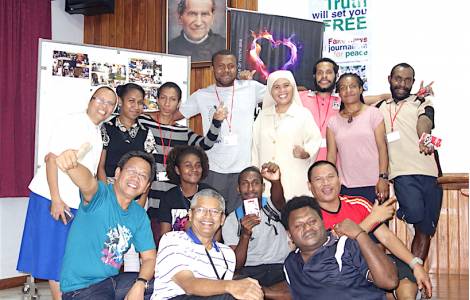
Port Moresby (Agenzia Fides) - The country has a 95% Christian population, but is not based on a "state religion": this is the concept of state in Papua New Guinea, which has been independent since 1975 after Australian colonization. The constitution adopted that year officially proclaimed the "Independent State of Papua New Guinea", with the preamble to the charter containing a reference to "Christian values". In recent years, and in the first months of 2024, motions have been submitted to Parliament for possible constitutional changes to transform the nation into the "Christian State of Papua New Guinea". Since 1847, when the first Catholic missionaries, the Marist Fathers, arrived in the country, traditional belief systems and Christianity have coexisted at various levels. Later, Christian missionaries of various denominations (especially Anglicans and Lutherans) arrived, and since the 1970s, Pentecostals and evangelicals have become more widespread.
It was the representatives of the Pentecostals in particular, with the support of politicians, who proposed changes to the charter, but these did not meet with the approval of the Catholic Church. A letter sent to the government in recent months and signed by the Archbishop of Port Moresby, Cardinal John Ribat (who is also President of the Papua New Guinea Ecumenical Council of Churches), states that they do not agree with the creation of a "confessional state" or with the attempt to enshrine the country's Christian identity in the constitution.
The text notes that this could lead to a "change in the character of the State" and the existing balances, recalling that the Constitution guarantees freedom of conscience, thought and religion and the right of every citizen to freely practice his faith: a democratic regulatory framework based on the rule of law that allows the peaceful and free development of any religious community. The current model is considered valid by the Catholic Church: priests, religious and missionaries in Papua recall that there is a fruitful cooperation between the State and the Churches, especially in the health and education sectors, which is reflected in the "Church-State Partnership Program". The Anglican Church, the Seventh-day Adventist Church, the Baptist Union, the Catholic Church, the Lutheran Church and the Salvation Army, as well as other Christian churches and organizations, run about 60% of the schools, health services and social facilities in the country. The government subsidizes these institutions and contributes to the salaries of teachers and health personnel who work in these institutions, in recognition of their role and public service.
The country has about 9 million inhabitants, 95% of whom are Christian (64% Lutheran, 27% Catholic, 4% other denominations), with minorities of other religions and traditional cults. (PA) (Agenzia Fides, 6/9/2024)